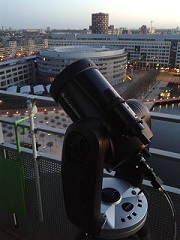| Home | Software | Imaging | Astronomy | Gallery | Blog |

|
 |
www.chrfr.de |

Balcony Observatory 
The fountain of youth. Credit: NASA, ESA and the Hubble Heritage Team (STScI/AURA) |
I am highly interested in astronomy. For me, it is about understanding the world we live in. So, I always liked learning about it, whether from books, astronomy sites, podcasts, or the occasional scientific paper. In July 2010 I enroled as part-time student in a distance education Master of Astronomy program, where I expect to graduate end of 2013 For most of my life that interest was more of a theoretical nature, because I am inherently lazy, do not like to travel or be burdened with hardware, and also have a low tolerance for spending freezing nights outdoors. I did familiarize myself a bit with the night sky by walking to the park at night, and even purchased a pair of 7x50 binoculars. However, things changed recently when I moved into a 15th floor apartment with balcony and felt the sudden obligation to make use of the view. I got an 8" telescope dedicated for home use only, on an easy-to-setup Alt-Az mount, with a camera so I don't have to do the being-outside-in-person thing all the time. You can find some astroimages in the gallery. Astronomy is a great science for amateurs and there are many ways to get involved that do not require a special background or a telescope: The Galaxy Zoo project was originally created to let you classify galaxies by their visual appearance, but since then has diversified to include things like analyzing craters on the moon and looking for exoplanets around other stars! Similar projects for citizen science are hosted on CosmoQuest, and you could also observe variables stars (even with the naked eye). In 2009 there was a special focus on Epsilon Aurigae, and you can still find an outdated animation I made based on what the system was thought to look like back then. Finally, I have compiled a short list of great astronomy resources. |